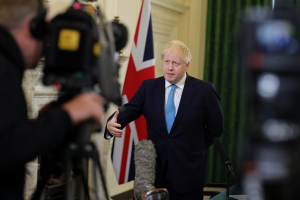Support migrant centric journalism today and donate

A damning letter written by two doctors and published in the South African Medical Journal has blamed the UK’s visa and immigration policy for the poaching of health workers from the world’s poorest countries. Current UK immigration rules recognise most healthcare roles as shortage occupations.
As a result, health professionals including doctors, nurses, paramedics, radiographers, occupational therapists, speech and language therapists and more, benefit from a reduced UK visa fee and help with relocating when offered a job in the NHS. In 2020, the Home Office launched the exclusive Health and Care visa for overseas health professionals.
The two doctors described the poaching of medical professionals from the world’s poorest regions as ‘insensitive’ and ‘morally questionable’.
High proportion of foreign doctors
In their letter, Professor Johannes Fagan from the University of Cape Town and Professor Mahmood Bhutta from the Royal Sussex County Hospital wrote: “The UK already has one of the highest proportions and overall numbers of overseas-qualified doctors in its workforce, yet continues to actively encourage and support overseas health workers to relocate.”
Meanwhile, Britain’s overseas recruitment drive shows no signs of slowing. A recent report published by the UK General Medical Council (GMC) hinted that the overall number of health professionals in the UK will need to rise further and said there would be a ‘continuation of foreign doctors joining the NHS in large numbers.’
Bhutta and Fagan criticised the UK’s long-running practice of hiring health workers from overseas to plug gaps in Britain’s healthcare system.
The pair referred to data released in 2019, which revealed that 35% of doctors licenced to practice in the UK had obtained their qualifications overseas.
Nearly 200,000 NHS staff from overseas
Official statistics on the NHS workforce show that more than 170,000 of the 1.28 million staff are from other countries, representing nearly 14% of NHS personnel. Approximately 67,000 are from EU countries, while a further 64,000 are from Asian regions.
Meanwhile, 1,719 are from South Africa, 806 are from Kenya, 4,192 are from Zimbabwe and 8,421 are from Nigeria.
A House of Commons report revealed that the proportion of non-EU nurses working in the NHS increased from 8% in 2015 to 22% between 2019 and 2020.
Commenting on the migration of doctors from so-called poor countries to the UK, Bhutta and Fagan referenced a 2006 World Health Organisation (WHO) report, which revealed that at least 25% of doctors in sub-Saharan Africa had migrated, despite just 5% of the population having access to adequate healthcare.
Professor Fagan argued that there is a distinction between migration and recruitment and said that the UK’s aggressive hiring of medical professionals from poorer nations is ‘insensitive’ and ‘morally questionable’.
He said: “I have no problem with migrating but I do have a problem with countries recruiting and I think that’s where I draw the line. I understand there are doctors and nurses in this country who want to seek greener pastures elsewhere because things are often difficult here. I do have a problem with an active recruitment process that is happening in the UK.”
Government intervention
Fagan said that he wanted to see more done to make it attractive for people to stay and wanted to know if the South African government has actually attempted to intervene and tell the UK to stop hiring doctors and nurses from countries where they are desperately needed.
He said: “We have an agreement with other SADC countries not to recruit doctors from there, with the whole idea of not doing what the UK is doing. So the question is whether or not we have picked up the same agreement with the UK, the US and Australia.”
UK denies claims
While the South African government has offered no response to the letter, the UK health department has fervently denied that it is actively recruiting health workers from nations with few resources.
In an email sent to South African news agency, GroundUp, the UK health department wrote: “The medical profession is an international mobile occupation and we are aware that a significant number of doctors from low-income or lower-middle-income countries migrate to the UK to work in the NHS of their own accord, rather than being proactively targeted.”
“We are reviewing and updating our Code of Practice and list of countries we will not actively recruit from to protect weaker health systems, with engagement from other government departments and the World Health Organisation (WHO).
“We are also ensuring ethical recruitment practices are followed through improved agency frameworks and comprehensive guidance for recruiters,” the email added.
Workpermit.com can help with Sponsor Licences
If you need help with employing Skilled Workers and help to apply for a Sponsor Licence, including complying with your Sponsor Licence obligations, workpermit.com can help.
For more information and advice on Sponsor licences, please contact us on 0344 991 9222 or at london@workpermit.com





















